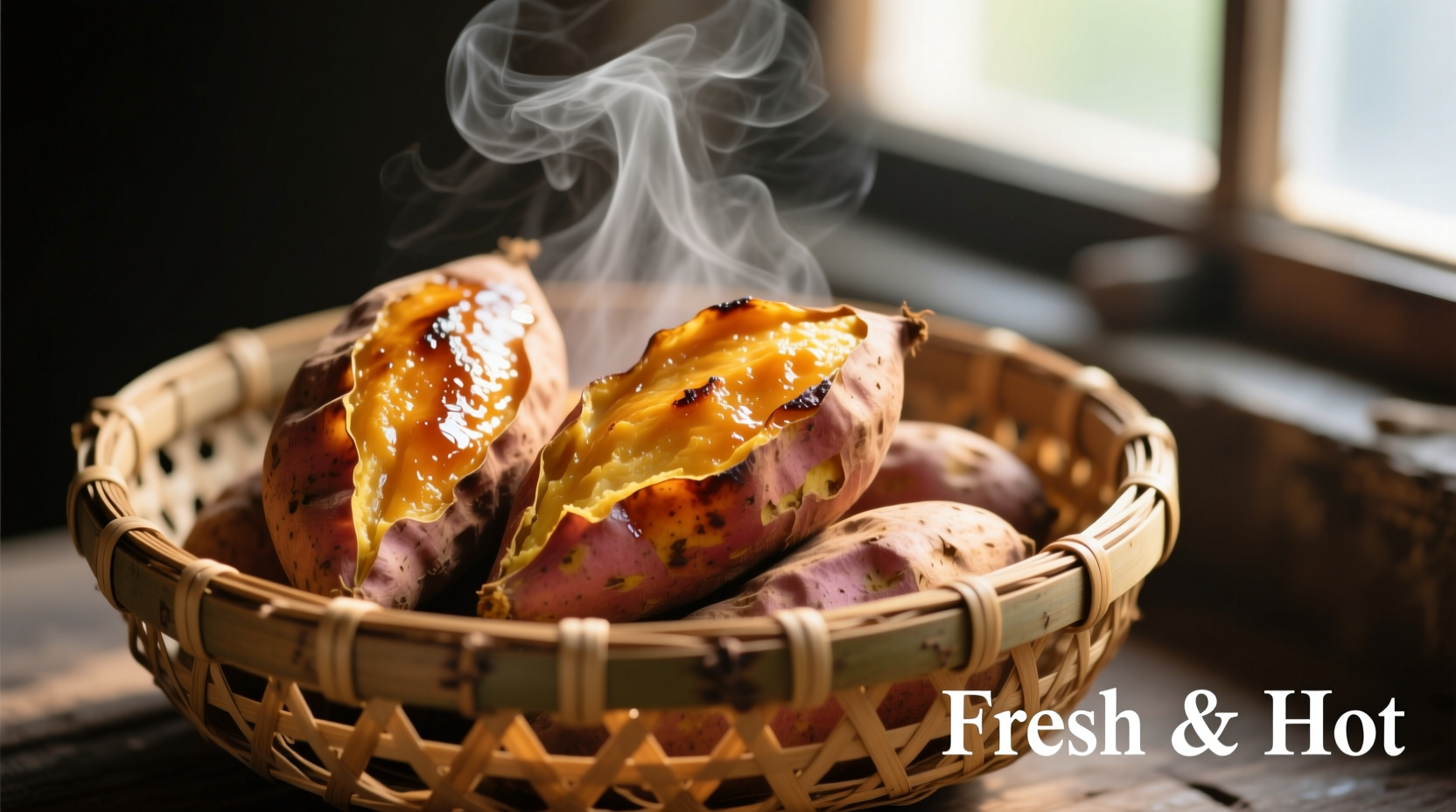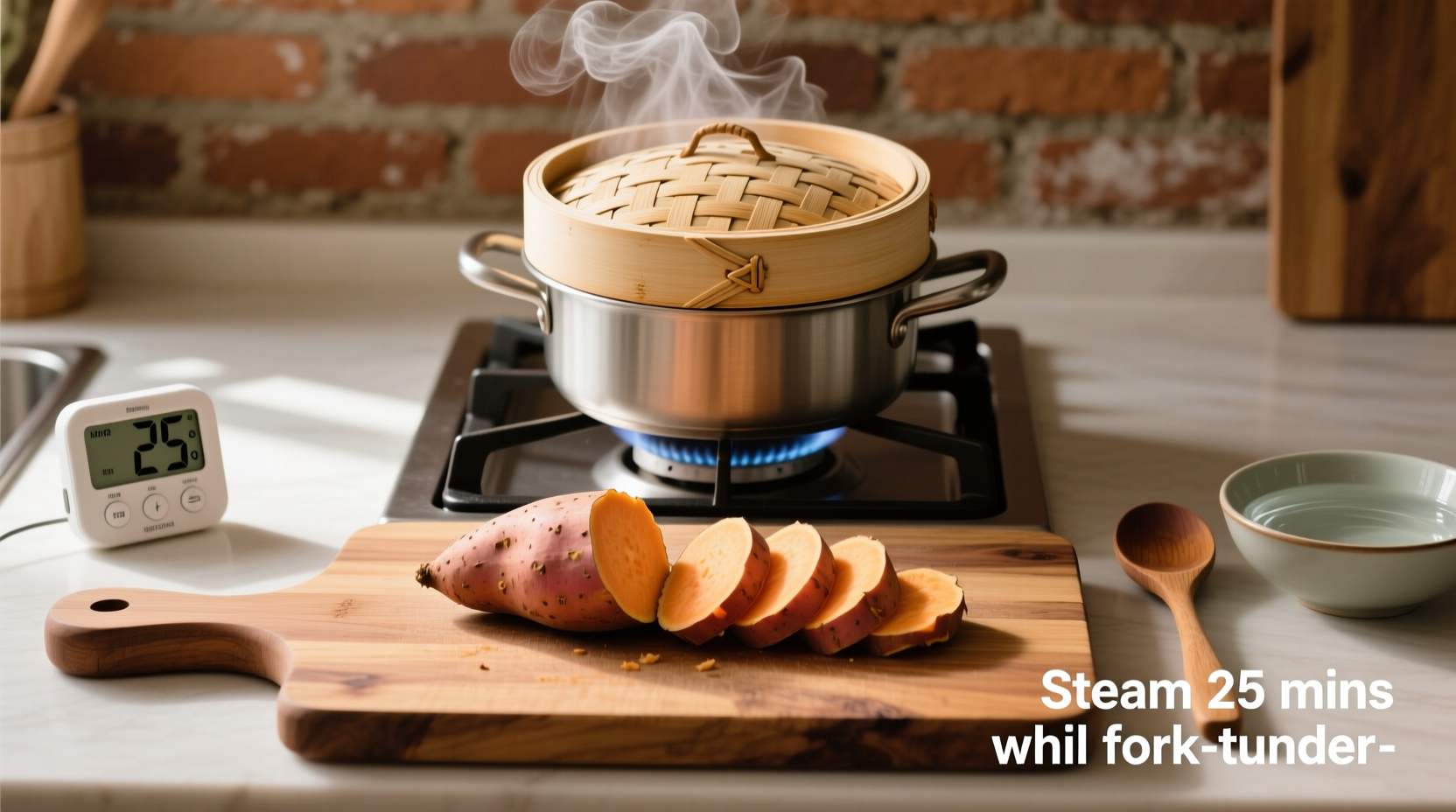Steam sweet potatoes perfectly in just 15-20 minutes by placing cubed or whole potatoes in a steamer basket over 1 inch of boiling water, covering tightly, and cooking until fork-tender. This method preserves 25% more nutrients than boiling while maintaining vibrant color and natural sweetness.
Steaming sweet potatoes delivers restaurant-quality results with minimal effort—no boiling water to watch, no messy peels, and maximum nutrient retention. As a chef who's taught thousands of home cooks professional techniques, I've found this method consistently produces fluffy interiors with concentrated flavor that other cooking methods can't match. Whether you're meal prepping, making baby food, or crafting a healthy side dish, steaming transforms this humble root vegetable into a culinary star.
Why Steaming Beats Other Cooking Methods
Unlike boiling, steaming prevents water-soluble vitamins like vitamin C and B-complex from leaching into cooking water. According to USDA research, steamed sweet potatoes retain up to 25% more nutrients than their boiled counterparts. The gentle heat also preserves their vibrant orange color better than roasting, which can cause browning through caramelization.
| Cooking Method | Time Required | Nutrient Retention | Texture Result |
|---|---|---|---|
| Steaming | 15-20 minutes | 90-95% | Fluffy, moist |
| Boiling | 20-25 minutes | 70-75% | Waterlogged |
| Roasting | 40-50 minutes | 80-85% | Caramelized exterior |
Step-by-Step Steaming Process
Preparation Essentials
Choose medium-sized sweet potatoes (about 6-8 ounces each) for even cooking. Larger specimens often have tough cores that resist steaming. You'll need:
- Steamer basket (bamboo or metal)
- Pot with tight-fitting lid (3-4 quart capacity)
- 1 inch of water (never let water touch potatoes)
- Optional: lemon juice to preserve color
Wash thoroughly but don't peel—the skin protects nutrients during cooking and contains valuable fiber. For faster cooking, cut into 1-inch cubes. For whole sweet potatoes, pierce skin 3-4 times with a fork to prevent bursting.
Perfect Steaming Technique

Follow these professional steps for foolproof results:
- Add 1 inch of water to pot (use filtered water for best taste)
- Bring to rolling boil over high heat
- Place potatoes in steamer basket, leaving space between pieces
- Carefully position basket over boiling water
- Cover tightly with lid to trap steam
- Reduce heat to maintain gentle simmer
- Steam 15-20 minutes for cubes, 25-35 for whole potatoes
The FDA recommends cooking sweet potatoes to an internal temperature of 205°F (96°C) for optimal texture and safety. This temperature destroys harmful bacteria while preserving nutrients better than higher heat methods.
Pro Tips for Perfect Results
Seasoning steamed sweet potatoes requires different timing than boiled versions. Add salt and seasonings after cooking since the dry surface won't absorb flavors during steaming. For baby food, skip added fats—the natural sugars concentrate beautifully through steaming.
Don't overcrowd the steamer basket—this creates steam pockets that cause uneven cooking. If cooking multiple batches, keep finished potatoes warm in a 200°F oven rather than leaving them sitting in the steamer, which continues the cooking process.
Troubleshooting Common Issues
Problem: Soggy texture
Solution: You've likely used too much water or left potatoes sitting in residual moisture. Always remove from steamer immediately and let drain for 2 minutes.
Problem: Uneven cooking
Solution: Cut pieces to uniform size (1-inch cubes work best). For whole potatoes, choose similar diameters.
Problem: Bitter taste
Solution: Older sweet potatoes develop bitterness. Store in cool, dark place and use within 3-4 weeks of purchase.
Serving Suggestions That Shine
Steamed sweet potatoes work beautifully in both savory and sweet applications. For a protein-packed meal, mash with black beans and top with cilantro. Their concentrated sweetness makes them ideal for desserts—try folding cubes into warm oatmeal with cinnamon. Nutrition research shows that pairing sweet potatoes with healthy fats like avocado or olive oil increases absorption of beta-carotene by up to 50%.
Frequently Asked Questions
Can I steam sweet potatoes without peeling them?
Yes, steaming with skin intact preserves maximum nutrients and prevents waterlogging. The skin becomes easily removable after cooking if desired. Just ensure you wash thoroughly before steaming to remove any surface dirt.
How do I know when steamed sweet potatoes are done?
Insert a thin knife or skewer into the thickest part. It should slide in with no resistance. For cubes, test multiple pieces as size variations affect cooking time. Whole sweet potatoes will feel slightly soft when gently squeezed with oven mitts.
What's the best way to reheat steamed sweet potatoes?
Reheat in a covered dish with one tablespoon of water in a 300°F oven for 10-15 minutes. Avoid microwaving as it creates uneven heating and can make them rubbery. For meal prep, store in airtight containers for up to 5 days in the refrigerator.
Can I steam sweet potatoes for baby food?
Absolutely. Steaming preserves more nutrients than boiling, making it ideal for baby food. Cut into small cubes, steam until very tender, then blend with a little breast milk or formula if needed. The natural sweetness requires no added sugars. Always cool completely before serving.











 浙公网安备
33010002000092号
浙公网安备
33010002000092号 浙B2-20120091-4
浙B2-20120091-4